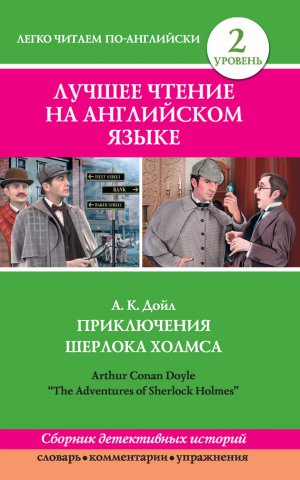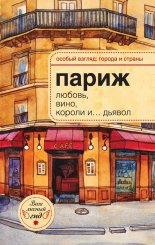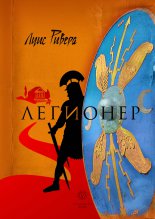Приключения Шерлока Холмса / The Adventures of Sherlock Holmes (сборник) Дойл Артур

Иллюстрации И. В. Кульбицкой
© ООО Издательство АСТ, 2014
Предисловие
Артур Игнатиус Конан Дойл родился 22 мая 1859 года в Эдинбурге. Его отец, Чарльз Альтамонт Дойл, был художником и архитектором, а мать увлекалась литературой и, обладая ярким воображением, являлась великолепной рассказчицей.
Материальное положение семьи Дойлов было достаточно скромным, и родители не могли обеспечить способному мальчику хорошее образование, поэтому, увидев в ребенке потенциал, богатые родственники отправили Артура учиться в иезуитский колледж Стоунхерст. Обучение в колледже было предельно строгим, а учащиеся подвергались физическим наказаниям, но тем не менее это не помешало Дойлу стать популярной личностью среди сверстников и открыть в себе способности к сочинительству.
В дальнейшем Дойл получил медицинское образование в Эдинбургском университете, где познакомился с начинающими литераторами Джеймсом Барри, Робертом Льюисом Стивенсоном, а также одним из прототипов сыщика Шерлока Холмса – преподавателем Джозефом Беллом. Именно во время учебы в университете Дойл публикует свои первые рассказы.
По окончании университета Дойл занимается врачебной практикой, не забывая и о литературном творчестве. В 1887 году выходит первый роман Дойла о Шерлоке Холмсе – «Этюд в багровых тонах». Роман тепло принимается публикой, и на протяжении последующих нескольких лет Дойл создает другие произведения о Холмсе, среди которых «Знак четырех», «Собака Баскервилей» и несколько сборников рассказов.
С тех пор прошло немало лет, но произведения Артура Конан Дойла о Шерлоке Холмсе по-прежнему пользуются большой популярностью среди читателей самых разных возрастов. Они были переведены более чем на 70 языков, экранизированы бесчисленное количество раз, а сам Шерлок Холмс на сегодняшний день, пожалуй, является самым известным сыщиком в мире литературы.
Пестрая лента
The Adventure of Speckled Band
Адаптация текста, упражнения, комментарии и словарь Е. В. Глушенковой
I
On glancing over my notes of the cases in which I have studied the methods of my friend Sherlock Holmes, I find many tragic, some comic, a large number strange, but no commonplace cases. He worked rather for the love of his art than for money and he refused to associate himself with any investigation which did not have anything unusual and even fantastic in it. Of all these cases, however, I cannot recall any which was more unusual than that which was associated with the well-known family of the Roylotts ofStoke Moran[1]. The events occurred in the early days of my association with Holmes, when we were sharing rooms in Baker Street.
It was early in April in the year 1883 that I woke one morning to find Sherlock Holmes standing, fully dressed, by the side of my bed.He was a late riser[2], as a rule, and as the clock showed me that it was only a quarter-past seven, I looked up at him in some surprise.
“Very sorry to wake you up, Watson,” said he, “but Mrs. Hudson has been woken up, and she woke me up.”
“What is it, then – a fire?”
“No, a client. A young lady has arrived. She is waiting now in the sitting-room. When young ladies call on you at this hour of the morning, I think that it is something very pressing. If it is an interesting case, I am sure, you would like to follow it from the beginning.”
“My dear fellow, I shall be ready in a minute.”
I put on my clothes and was ready in a few minutes to accompany my friend down to the sitting-room. A lady dressed in black rose as we entered.
“Good-morning, madam,” said Holmes. “My name is Sherlock Holmes. This is my friend and associate, Dr. Watson, before whom you can speak as freely as before myself. I am glad to see that Mrs. Hudson has lighted the fire. Please sit near it, and I shall ask a cup of hot coffee for you, for I see that you are shivering.”
“It is not cold which makes me shiver[3],” said the woman in a low voice.
“What, then?”
“It is fear, Mr. Holmes. It is terror.” She looked up as she spoke, and we could see her pale face with frightened eyes.She must be a woman of thirty[4], but her hair was turning gray.
“You must not fear,” said he. “We shall soon help you, I have no doubt. You have come to London by train this morning, I see.”
“You know me, then?”
“No, but I see your return ticket in your left glove.You must have started early[5], and you had a long drive in a dog-cart, along heavy roads, before you reached the station.”
The lady looked in bewilderment at my companion.
“There is no mystery, my dear madam,” said he, smiling. “The left arm of your jacket is covered with mud. The marks are perfectly fresh. Only a dog-cart throws up mud in that way.”
“You are perfectly correct,” said she. “I started from home before six, and came in by the first train toWaterloo[6]. Sir, I can stand this strain no longer[7]; I shall go mad if it continues. I have heard of you, Mr. Holmes; I have heard of you from Mrs. Farintosh, whom you helped. It was from her that I had your address. Oh, sir, do you not think that you could help me, too? At present I cannot reward you, but in a month or six weeks I shall be married and shall have my own income, and then you will not find me ungrateful.”
Holmes turned to his desk and took a small book, which he consulted.
“Farintosh,” said he. “Ah yes, I recall the case. I think it was before your time, Watson. I can only say, madam, that I shall be happy to investigate your case as I did for your friend. As to reward, my profession is its own reward; but you can pay me at the time which suits you best. And now I ask you to tell us everything that may help us in to form an opinion upon the matter.”
“Alas!” said our visitor, “the horror of my situation lies in the fact that my fears are so vague, that even the man who cares for me looks upon all that I tell him as the fancies of a nervous woman. He does not say so, but I can read it in his eyes.”
“I am all attention, madam.”
Exercises
1. Answer the questions:
1. When did Sherlock Holmes investigate the case of the Roylotts of Stoke Moran?
2. Where did Sherlock Holmes live? Who did he share the rooms with?
3. Why did Sherlock Holmes wake up Dr.Watson very early one morning?
4. What did the client look like?
5. How did Sherlock Holmes surprise their visitor?
6. How did he learn all the information about the client?
7. Who did the client learn about the detective from?
8. Why did the client come to Holmes for help?
9. What did she tell Holmes about her financial position?
Think and say
1. What do you think is the role of Dr.Watson in Sherlock Holmes’ investigations?
2. What does Holmes’ behaviour at the beginning of the story tell us about his character?
2. Find the following words and phrases in the text and reproduce situations from the text with them. Give Russian equivalents.
1. rather… than
would rather do smth than do smth else
2. to occur
It occurred to smb
3. to share a room / flat
4. as a rule
5. to call on smb
6. to accompany smb to some place
7. to investigate a case
8. to care for smb / smth
3. Paraphrase the underlined parts of the sentences so as to use the words and phrases above.
1. Sherlock Holmes usually allowed Dr. Watson to follow his investigations.
2. Sherlock Holmeslooked intoa lot of tragic events.
3. When my friend told me she felt nervous before her first concert I offeredto go there with her.
4. The two sisterslived in the same room.
5. Anne’s grandmother lived next door and the girl oftenvisited herafter classes.
6. Sherlock Holmespreferred doing nothing to investigating common cases.
7. I don’t really think that heloves anyonebut himself.
8. I don’t know when the accidenthappened.
9. When Dr. Watson was woken up very early in the morning, hehad an ideathat the house was on fire.
10. The teacher said hewould prefer teachingbright students for a small pay to teachingstupid students for a higher pay.
4. Complete the sentences with the words and phrases above in the correct form.
1. Emily… an office with eight other people. She says it’s very noisy there…
2. When Anne arrived at the hospital she said she’d….. a ward with some other patients… have a private ward. It was the first time she was in hospital and she wanted to have somebody to talk to.
3. If you’re afraid to go to the doctor, I can… you there.
4. Sherlock Holmes… a lot of… together with Dr. Watson and Police Inspector Lestrade.
5. Monica would like to become a vet as she… animals.
6. Tom would… travel by train… by air. He hates travelling by plane.
7. Evelyn was short of money and… to her that she could borrow some from her aunt.
8. Several car accidents… at the crossroads before traffic-lights were put up there.
9. Don’t cook curry for our party. We don’t… Indian food.
10. Helen Stoner… Sherlock Holmes early in the morning and asked him… her…
II
“My name is Helen Stoner, and I am living with my stepfather, who is the last of one of the oldest families in England, the Roylotts of Stoke Moran.
“The family was at one time among the richest in England, but at present only a few acres of land and an old house are left. The last squire lived the horrible life of a poor aristocrat; but his only son, my stepfathertook a medical degree[8] and went to India, where, by his professional skill and his force of character, he established a large practice. In a fit of anger, however, he beat his native servant to death and went to prison. After that he returned to England a gloomy and disappointed man.
“When Dr. Roylott was in India he married my mother, Mrs. Stoner, the young widow. My sister Julia and I were twins, and we were only two years old at the time of my mother’s second marriage. She had a considerable sum of money and all this she left to Dr. Roylott while we lived with him, but a certain sum should be paid to each of us every yearin the event of our marriage[9]. After our return to England my mother died – she was killed eight years ago in a railway accident. Dr. Roylott then left London and took us to live with him in the old house at Stoke Moran. The money which my mother had left was enough for all our wants, and it seemed we could be happy.
“But a terrible change occurred to our stepfather at this time. Instead of making friends with our neighbours, who at first were happy to see a Roylott back in Stoke Moran, he shut himself up in his house. When he seldom came out, he started quarrels with anyone whom he met. A number of horrible quarrels occurred, two of which ended in the court, until at last he became the terror of the village, and the people hid at his approach, for he is a man of great strength in his terrible fits of anger.
“He has no friends at all except gypsies, and he allows them to stay in the park near the house. He loves also Indian animals, and he has at this moment a cheetah and a baboon, which go freely over the park and are feared by the people of the village almost as much as their master.
“You can imagine from what I say that my poor sister Julia and I had no great pleasure in our lives. No servant stayed with us, and for a long time we did all the work of the house. She was thirty at the time of her death, but her hair was turning gray like mine.”
“Your sister is dead, then?”
“She died two years ago, and it is of her death that I wish to speak to you. You can understand that, living the life which I have described, we saw very few people. We had, however, an aunt, who we were allowed to visit. Julia went there at Christmas two years ago, and met there a young officer, to whom she became engaged. My stepfather learned of the engagement when my sister returned and did not say anything against the marriage; but two weeks before the wedding, the terrible event occurred and I lost my only companion.”
Sherlock Holmes had been sitting in his chair with his eyes closed, but now he glanced at his visitor.
“Please give us all the details,” said he.
“It is easy for me to do so, for I remember every event of that time. The house is, as I have already said, very old, and only the bedrooms are on the ground floor. Of these bedrooms the first is Dr. Roylott’s, the second is my sister’s, and the third is my own. There are no doors between them, but they all open out into the same corridor.
“The windows of the three rooms open out upon the park. That fatal night Dr. Roylott had gone to his room early, though we knew that he had not gone to bed, for my sister was troubled by the smell of the strong Indian cigars which he smoked. She left her room, therefore, and came into mine, where she sat for some time, talking about her approaching wedding. At eleven o’clock she rose to leave me, but she paused at the door and looked back.
“ ‘Tell me, Helen,’ said she, ‘have you ever heard anyone whistle at night?’
“ ‘Never. But why?’ said I.
“ ‘Because during the last few nights I have always, about three in the morning, heard a low, clear whistle. I cannot tell where it came from – perhaps from the next room, perhaps from the park. I thought that I would ask you whether you had heard it.’
‘No, I have not.It must be those gypsies in the park[10].’
“ ‘Very likely. And if it were in the park, it is strange that you did not hear it also.’
“ ‘Ah, but I do not hear anything when I am asleep.’
She smiled back at me, closed my door, and a few moments later I heard her key turn in the lock.”
“Did you always lock yourselves in at night?” asked Holmes.
“Always.”
“And why?”
“I think that I said that the doctor kept a cheetah and a baboon. We had no feeling of security if our doors were not locked.”
“I see. But forgive me for interrupting you. Please continue your story.”
Exercises
1. Answer the questions:
1. What did you learn about the Roylotts of Stoke Moran?
2. Why did Dr. Roylott return to England from India a gloomy and disappointed man?
3. How did it happen that Dr. Roylott lived in Stoke Moran with his two stepdaughters?
4. Who else lived in the house?
5. What were the relations between Dr. Roylott and other people in the village?
6. Why weren’t Julia and Helen happy?
7. How did it happen that Julia became engaged to be married?
8. What did you learn about the house where Julia’s tragic death occurred?
9. What did the sisters speak about before Julia’s death?
10. Why did the sisters lock their bedrooms?
Think and say
1. Was Dr. Roylott a good doctor? Would you like him to be your family doctor? Why do you think so?
2. Was it easy for the sisters to marry? Why do you think so?
2. Find the following phrases in the text and reproduce situations from the text with them. Give Russian equivalents.
1. to be left
2. to leave smth to smb
3. to make friends with smb
4. to be / become engaged to smb
engagement (to smb)
5. to open out on / upon / into
3. Paraphrase the underlined parts of the sentences so as to use the phrases above.
1. Tony is a very sociable boy, he canbecome the friend of anybody.
2. How longbefore the wedding did they agree to get married?
3. It was only after his aunt’s death that Robert learnedhe would get her house after her death.
4. After he paid all his debts, no more moneyremained.
5. Their roomfacesthe park, so they have a very nice view.
6. Have you heard that John has broken offhis agreement to marryJune? – I didn’t even know that they agreed to marry.
7. After Miss Stoner’s sister died, sheremainedalone with her stepfather.
4. Complete the sentences with phrases above in the correct form.
1. Susan doesn’t want her bedroom… the sea. She says the noise of the sea won’t let her sleep.
2. There were a lot of shops in the street a few years ago. But only two… The others have been closed.
3. I didn’t know that Alex and Anne… to be married.
4. When Bob came to a new school, he wanted… his new classmates.
5. Peter’s father… him his gold watch, and Peter always wears it.
6. Walter gave Alice an… ring. They are to be married next month.
7. After her children married, Mrs Sykes… alone in her big house.
III
“I could not sleep that night. I had a vague feeling that something bad was coming. It was a wild night. The wind was very strong outside, and the rain was beating against the windows. Suddenly, there was a wild scream of a terrified woman. I knew that it was my sister’s voice. I got out of my bed, and rushed into the corridor. As I opened my door I seemed to hear a low whistle, such as my sister described, and a few moments later a strange sound, as if metal had fallen. As I ran down the corridor, my sister’s door was unlocked, and opened slowly. By the light of the corridor-lamp I saw my sister appear in the doorway, her face pale with terror, she could hardly stand. I ran to her and threw my arms round her, but at that moment she fell to the ground. She seemed to be in terrible pain. As I bent over her she suddenly cried out in a voice which I shall never forget, ‘Oh, my God! Helen! It was the band! The speckled band!’ There was something else which she wanted to say, and she pointed her finger at the door of the doctor’s room, but she could not speak. I called loudly for my stepfather, and I saw him running from his room. When he reached my sister’s side she was unconscious, and though he sent for a doctor from the village,she died without having recovered her consciousness[11].”
“One moment,” said Holmes, “are you sure about this whistle and metallic sound?”
“That was what the police asked me. I believe I heard it, butI may have made a mistake.[12]”
“Was your sister dressed?”
“No, she was in her night-dress. In her right hand wе found a burnt match, and in her left a match-box.”
“It shows that she struck a light and looked about her when she heard a noise. That is important. And what conclusions did the police come to?”
“They investigated the case with great care, for Dr. Roylott had a very bad reputation, but they were unable to find any satisfactory cause of death. The door was locked on the inside, and the windows were blocked. The walls and the floor were examined, with no result. It is clear, therefore, that my sister was alone when she met her end. Besides, there were no marks of any violence upon her.”
“How about poison?”
“The doctors examined her for it, but without any result.”
“What do you think your sister died of, then?”
“I believe she died of fear and nervous shock, though what frightened her I cannot imagine.”
“Were there gypsies in the park at the time?”
“Yes, there are nearly always some there.”
“Ah, and what did you think of her last words – a speckled band?”
“Sometimes I have thought that she spoke of some band of people, perhaps of the gypsies in the park. So many of them wear the speckled handkerchiefs over their heads.”
Holmes shook his head like a man who was not satisfied.
“Two years have passed since then, and my life has been lonelier than ever. A month ago, however, a dear friend, whom I have known for many years, asked my hand in marriage. His name is Armitage – Percy Armitage. My stepfather has nothing against the marriage, and we are to be married in spring. Two days ago some repairs were started in the house, and I had to move into the room in which my sister died, and to sleep in the bed in which she slept. Imagine, then, terror when last night I suddenly heard the low whistle which my sister had heard before her death. I got up and lit the lamp, but saw nothing unusual in the room. I was too frightened to go to bed again, however, so I dressed, and as soon as it was daylight I left the house, got a dog-cart and drove to the station, from where I have come on this morning to see you and to ask your advice.”






